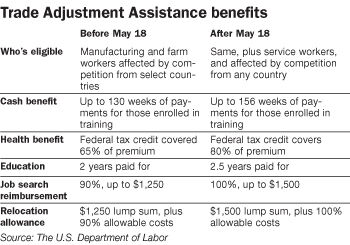Jobless program faces backlog

A federal program that retrains workers displaced by foreign competition has been flooded with applications, leading to a logjam in Maine as the jobless await benefits.
The Trade Adjustment Assistance program, familiar in Maine to many paper industry workers, offers cash, health and retraining benefits to employees whose jobs are shipped overseas or are affected by global trade. Last May, the program was expanded under the economic stimulus plan to offer sweetened benefits and wider eligibility.
That expansion, coupled with rising unemployment, has led to a spike in demand. From May to December of last year, the federal Department of Labor received 3,443 applications, which can be filed by a company or group of at least three employees. That’s a roughly 40% increase over all of 2008, when the department processed 2,470 applications.
In Maine, 21 applications have been certified since last May, and another 16 to 18 are pending, according to Judy Pelletier, who oversees the TAA program for the state. That rate by far outpaces all of the previous year, when the state certified 22 applications between May 2008 and May 2009. “It’s a large increase,” she says, the highest since she took the position four years ago. By May of this year, the rate could top the 2003 total, the highest in recent years, when the state processed 63 applications, 28 of which were certified, according to federal Department of Labor statistics.
Companies and workers who filed before the May 18 deadline were encouraged to withdraw and then resubmit their petitions to qualify for the improved benefits, contributing to the backlog, Pelletier says. And the state is busily spreading the word about the program, she says. “We try to get whoever we can certified.”
Predictably, applications are taking longer to process. DOL staffers in Washington, D.C., who investigate whether the job losses can be attributed to foreign trade, are struggling to keep up. Some applications have taken longer than the preferred 40-day turnaround to process, Pelletier says.
Getting certified has become more difficult in recent months, according to Duane Lugdon, Maine’s international representative for the United Steelworkers Union, which represents about 12,000 paper workers in the state. Lately, petitions are often rejected at first but later certified on appeal, he says. “So instead of getting it the first time around, they’re kind of running you around a little bit,” Lugdon says. Still, the expanded TAA benefits have been a “blessing,” he says.
The TAA program, initiated in 1962 to retrain workers in new fields in the face of increased global trade, was broadened under the economic stimulus act. Now, qualified workers get a federal tax credit covering 80% of their health insurance premium, compared with 65% before, up to 2.5 years of unemployment checks, up from two years, and more help paying educational and transportation costs. Workers over 50 who take lower-paying jobs can also qualify for up to $12,000, up from $10,000 previously (see “Trade Adjustment Assistance benefits,” below).
The program, which has traditionally served manufacturing and farm workers, has also been opened to the service industry, such as call center workers. Few from that sector in Maine have applied so far, however, Pelletier says. UGL Unicco, a facilities maintenance company with a location in South Portland, was certified in September.
For fiscal year 2009, Maine’s TAA allotment totaled $3.5 million, out of $189.8 million nationally. A single application can represent anywhere from a handful to hundreds of employees, so it’s tough to say how many Maine workers are currently benefitting from the program, Pelletier says. According to 2007 federal data, the most recent available, the 18 applications certified in Maine that year represented an estimated 604 workers. Assuming the average application size remains constant, about 705 workers would have started receiving assistance since last May, with another 600 or so now awaiting word.
Rep. Mike Michaud, a longtime employee of Great Northern Paper in Millinocket, supported expanding the TAA benefits, but said in a statement that it’s crucial the federal DOL keeps up with demand. “If we are ever to stem the tide of trade-related layoffs, we must give our domestic businesses the chance to compete on a level playing field by changing our approach to international trade,” he says. “I have been in contact with the agency to express my concerns and will work with them to do whatever I can to ensure eligible workers receive this valuable assistance.”
In “one-horse towns” where pulp and paper mills are the primary source of employment, that assistance is critical, according to union representative Lugdon. “The TAA benefits have made it possible for some folks to continue to stay in the town where they live,” he says.










Comments